Galleries
Home
About
Welcome
Wildflowers

Can we actually suppose that we are wasting, polluting, and making ugly this beautiful land for the sake of patriotism and the love of God? Perhaps some of us would like to think so, but in fact this destruction is taking place because we have allowed ourselves to believe, and to live, a mated pair of economic lies: that nothing has a value that is not assigned to it by the market; and that the economic life of our communities can safely be handed over to the great corporations.
We Americans are not usually thought to be a submissive people, but of course we are. Why else would we allow our country to be destroyed? Why else would we be rewarding its destroyers? Why else would we all - by proxies we have given to greedy corporations and corrupt politicians - be participating in its destruction? Most of us are still too sane to piss in our own cistern, but we allow others to do so and we reward them for it. We reward them so well, in fact, that those who piss in our cistern are wealthier than the rest of us.
How do we submit? By not being radical enough. Or by not being thorough enough, which is the same thing.
- Wendell Berry
Lake Superior
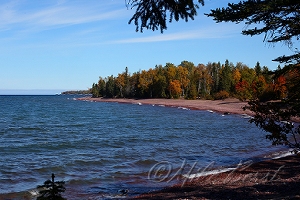
For the sake of "job creation," in Kentucky, and in other backward states, we have lavished public money on corporations that come in and stay only so long as they can exploit people here more cheaply than elsewhere. The general purpose of the present economy is to exploit, not to foster or conserve.
I believe until fairly recently our destructions of nature were more or less unwitting - the by-products, so to speak, of our ignorance or weakness or depravity. It is our present principled and elaborately rationalized rape and plunder of the natural world that is a new thing under the sun.
The new slavery has improved upon the old by giving the new slaves the illusion that they are free. The Economy does not take people's freedom by force, which would be against its principles, for it is very humane. It buys their freedom, pays for it, and then persuades its money back again with shoddy goods and the promise of freedom.
Where is our comfort but in the free, uninvolved, finally mysterious beauty and grace of this world that we did not make, that has no price? Where is our sanity but there? Where is our pleasure but in working and resting kindly in the presence of this world?
- Wendell Berry
Lake Michigan
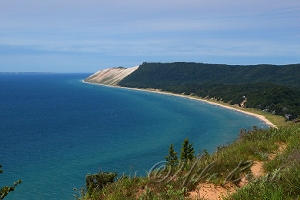
No settled family or community has ever called its home place an "environment." None has ever called its feeling for its home place "biocentric" or "anthropocentric." None has ever thought of its connection to its home place as "ecological," deep or shallow. The concepts and insights of the ecologists are of great usefulness in our predicament, and we can hardly escape the need to speak of "ecology" and "ecosystems." But the terms themselves are culturally sterile. They come from the juiceless, abstract intellectuality of the universities which was invented to disconnect, displace, and disembody the mind. The real names of the environment are the names of rivers and river valleys; creeks, ridges, and mountains; towns and cities; lakes, woodlands, lanes roads, creatures, and people.
We do not need to plan or devise a "world of the future"; if we take care of the world of the present, the future will have received full justice from us. A good future is implicit in the soils, forests, grasslands, marshes, deserts, mountains, rivers, lakes, and oceans that we have now, and in the good things of human culture that we have now; the only valid "futurology" available to us is to take care of those things. We have no need to contrive and dabble at "the future of the human race"; we have the same pressing need that we have always had - to love, care for, and teach our children.
- Wendell Berry
Inland Waters
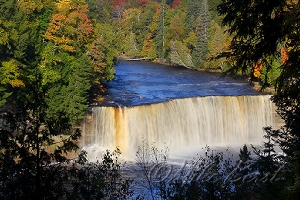
I am suggesting that most people now are living on the far side of a broken connection, and that this is potentially catastrophic. Most people are now fed, clothed, and sheltered from sources toward which they feel no gratitude and exercise no responsibility. There is no significant urban constituency, no formidable consumer lobby, no noticeable political leadership, for good land-use practices, for good farming and good forestry, for restoration of abused land, or for halting the destruction of land by so-called "development."
We are involved now in a profound failure of imagination. Most of us cannot imagine the wheat beyond the bread, or the farmer beyond the wheat, or the farm beyond the farmer, or the history beyond the farm. Most people cannot imagine the forest and the forest economy that produced their houses and furniture and paper; or the landscapes, the streams, and the weather that fill their pitchers and bathtubs and swimming pools with water. Most people appear to assume that when they have paid their money for these things they have entirely met their obligations.
Money does not bring forth food. Neither does the technology of the food system. Food comes from nature and from the work of people. If the supply of food is to be continuous for a long time, then people must work in harmony with nature. That means that people must find the right answers to a lot of hard practical questions. The same applies to forestry and the possibility of a continuous supply of timber.
- Wendell Berry
Shoreline
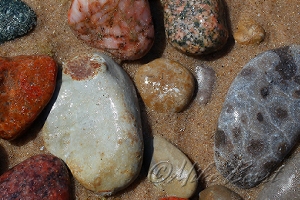
What I have been talking about is the possibility of renewing human respect for this Earth and all the good, useful, and beautiful things that come from it. I have made it clear, I hope, that I don't think this respect can be adequately enacted or conveyed by tipping our hats to nature or by representing natural loveliness in art or by prayers of thanksgiving or by preserving tracts of wilderness - although I recommend all those things. The respect I mean can be given only by using well the world's goods that are given to us. This good use, which renews respect - which is the only currency, so to speak, of respect - also renews our pleasure. The callings and disciplines that I have spoken of as the domestic arts are stationed all along the way from the farm to the prepared dinner, from the forest to the dinner table, from stewardship of the land to hospitality to friends and strangers. These arts are as demanding and gratifying, as instructive and as pleasing, as the so-called "fine arts". To learn them is, I believe, the work that is our profoundest calling. Our reward is that they will enrich our lives and make us glad.
- Wendell Berry
Wetlands
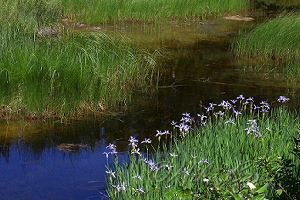
If we are concerned about land abuse, we have begun a profound work of economic criticism. Study of the history of land use (and any local history will do) informs us that we have had for a long time an economy that thrives by undermining its own foundations. Industrialism, which is the name of our economy, and which is now virtually the only economy of the world, has been from its beginnings in a state of riot. It is based squarely upon the principle of violence toward everything on which it depends, and it has not mattered whether the form of industrialism was communist or capitalist or whatever; the violence toward nature, human communities, traditional agricultures and local economies has been constant. The bad news is coming in, literally, from all over the world. Can such an economy be fixed without being radically changed? I don't think it can.
The Captains of Industry have always counselled the rest of us to be "realistic". Let us, therefore, be realistic. Is it realistic to assume that the present economy would be just fine if only it would stop poisoning the air and water, or if only it would stop soil erosion, or if only it would stop degrading watersheds and forest ecosystems, or if only it would stop seducing children, or if only it would quit buying politicians, or if only it would give women and favored minorities an equitable share of the loot? Realism, I think, is a very limited program, but it informs us at least that we should not look for bird eggs in a cuckoo clock.
- Wendell Berry
Dunes
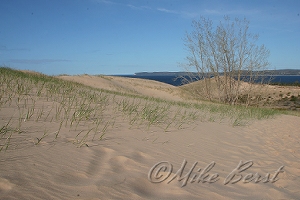
If it is unrealistic to expect wasteful industries to be conservers, then obviously we must lead in part the public life of complainers, petitioners, protesters, advocates, and supporters of stricter regulations and saner policies. But that is not enough.
If it is unreasonable to expect a bad economy to try to become a good one, then we must go to work to build a good economy. It is appropriate that this duty should fall to us, for good economic behavior is more possible for us than it is for the great corporations with their miseducated managers and their greedy and oblivious stockholders. Because it is possible for us, we must try in every way we can to make good economic sense in our own lives, in our households, and in our communities. We must do more for ourselves and our neighbors. We must learn to spend our money with our friends and not with our enemies. But to do this it is necessary to renew local economies and revive the domestic arts.
- Wendell Berry
Forest
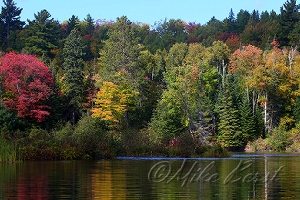
All of us who live in the suffering rural landscapes of the United States know that most people are available to those landscapes only recreationally. We see them bicycling or boating or hiking or camping or hunting or fishing or driving along and looking around. They do not, in Mary Austin's phrase, "summer and winter with the land". They are unacquainted with the land's human and natural economies. Though people have not progressed beyond the need to eat food and drink water and wear clothes and live in houses, most people have progressed beyond the domestic arts - the husbandry and wifery of the world - by which those needful things are produced and conserved. In fact, the comparative few who still practice that necessary husbandry and wifery often are inclined to apologize for doing so, having been carefully taught in our education system that those arts are degrading and unworthy of people's talents. Educated minds, in the modern era, are unlikely to know anything about food and drink, clothing and shelter. In merely taking these things for granted, the modern educated mind reveals itself also to be as superstitious a mind as ever has existed in the world. What could be more superstitious than the idea that money brings forth food?
- Wendell Berry
Critters

We have lived by the assumption that what was good for us would be good for the world. And this has been based on the even flimsier assumption that we could know with any certainty what was good even for us. We have fulfilled the danger of this by making our personal pride and greed the standard of our behavior toward the world - to the incalculable disadvantage of the world and every living thing in it. And now, perhaps very close to too late, our great error has become clear. It is not only our own creativity - our own capacity for life - that is stifled by our arrogant assumption; the creation itself is stifled.
We have been wrong. We must change our lives, so that it will be possible to live by the contrary assumption that what is good for the world will be good for us. And that requires that we make the effort to know the world and to learn what is good for it. We must learn to cooperate in its processes, and to yield to its limits. But even more important, we must learn to acknowledge that the creation is full of mystery; we will never entirely understand it. We must abandon arrogance and stand in awe. We must recover the sense of the majesty of creation, and the ability to be worshipful in its presence. For I do not doubt that it is only on the condition of humility and reverence before the world that our species will be able to remain in it.
- Wendell Berry
Agriculture

Why do farmers farm, given their economic adversities on top of the many frustrations and difficulties normal to farming? And always the answer is: "Love. They must do it for love." Farmers farm for the love of farming. They love to watch and nurture the growth of plants. They love to live in the presence of animals. They love to work outdoors. They love the weather, maybe even when it is making them miserable. They love to live where they work and to work where they live. If the scale of their farming is small enough, they like to work in the company of their children and with the help of their children. They love the measure of independence that farm life can still provide. I have an idea that a lot of farmers have gone to a lot of trouble merely to be self-employed to live at least a part of their lives without a boss.
As Gill says, "every man is called to give love to the work of his hands. Every man is called to be an artist." The small family farm is one of the last places - they are getting rarer every day - where men and women (and girls and boys, too) can answer that call to be an artist, to learn to give love to the work of their hands. It is one of the last places where the maker - and some farmers still do talk about "making the crops" - is responsible, from start to finish, for the thing made. This certainly is a spiritual value, but it is not for that reason an impractical or uneconomic one. In fact, from the exercise of this responsibility, this giving of love to the work of the hands, the farmer, the farm, the consumer, and the nation all stand to gain in the most practical ways: They gain the means of life, the goodness of food, and the longevity and dependability of the sources of food, both natural and cultural. The proper answer to the spiritual calling becomes, in turn, the proper fulfillment of physical need.
- Wendell Berry